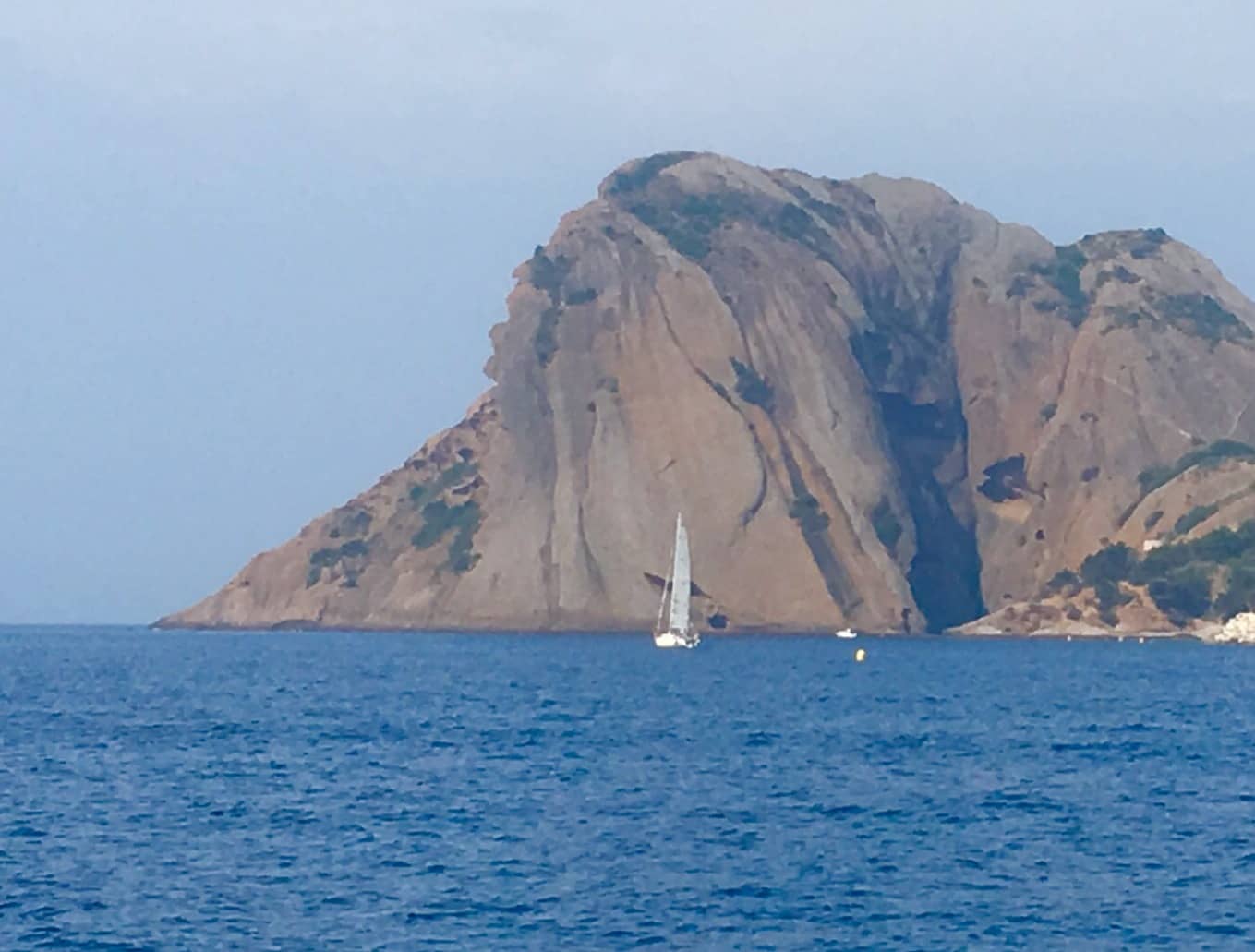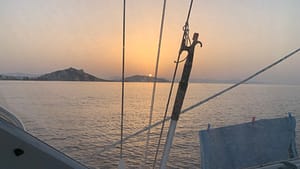"It's so beautiful going east. I would not bother going west, ”said David, who had come on board with his wife Jill to give us tips for sailing in the Mediterranean.
After many considerations, we decided to follow their advice and spend the next month experiencing the French coast east of Marseille.
We respect the Mediterranean. It is large. Almost 5 times larger than the North Sea. There are 4.000 km from Gibraltar in the west to Israel in the east and 800 kilometers from Croatia in the north to Libya in the south. The water depth is on average 1.500 meters. At the deepest place 5.200 meters. There is tiden even though access to the Atlantic Ocean at Gibraltar is only 14 kilometers wide. There is a rich wildlife. Among others, there are whales, dolphins, sharks and sea turtles, and over 20 countries, the Mediterranean has a coastline.
The eight different prevailing winds in the Mediterranean. The mistral, which blows in the south of France, is one of them.
It occurs when a low pressure in the Genoa bay is filled buy a high pressure in Bicayen. The current draws cold air from the Alps and can blow with hurricane strength 2. The mistlrale from the northwest last the 1-3 days. From the northeast it may last a week - sometimes longer. One from Port Napoleon told that he had experienced it blow for 52 days.
When the Mistral is not blowing, the temperature difference between land and water creates a sea breeze. It increases during the day. The wind can be strong, but takes off completely when the difference is evened out in the evening.
As the American we met in Toul expressed it
- “The Med is a shitty place to sail. Either the wind blows the hell out of you or it does not blow at all ”
We made the Heron ready for ocean sailing. Stacked the bikes together, stowed the boot with loose parts, put safety lines on the deck, checked safety and emergency equipment, once again studied the weather forecast and route we had on the chartplotter and backed up on the iPad.
Early in the evening a Danish boat docked. It was John. He had lived in the south of France for many years and sailed in the area in almost as many. Now he was in Port Napoleon to get the boat on land and clean and antifoul the bottom. We invited him on board, got good advice on sailing on the Mediterranean and was recommended to use a weather app from the French weather service Meteo.
To conclude the good advice, he generously left us his paper maps of Corsica.
The next morning we said goodbye to John, took the moorings and left Port Napoleon. When we got out of the well protected bay, we headed for Marseille and got a light wind straight towards us. There were still some waves after the days of Mistral. They now ran almost perpendicularly to the wind and gave a little turbulent sailing. But nice with lots of water under the keel, to be free of locks and again to see the germ.
After a couple of hours of motor sailing, the archipelago islands of Îles du Frioul emerged from the heat. The archipelago, located 3 kilometers off Marseille, consists of 4 islands. Two of them are connected by a low dam of concrete. The marina for guest boats is large, has over 100 seats, but there were almost no guests.
In the entrance we were received by a young employee from the port office.
- "You can dock where you want to," he shouted, smiling in English, before he gave his Mercury motor full throttle and sailed on.
There are 150 people living on the island. It is popular as a destination for tours and has a ferry service to Marseille departing every hour. In the evening we saw from the cockpit the lights in Marseille and the former prison Château d 'If, located on the island of If. This was where Dumas let his hero Edmond Dantès be locked in for 21 long years in the novel Count of Monte Cristo.
The next morning we bathed in the crystal clear water before heading up to Cassis up the morning.
David and Jill were right.
The coastline was spectacular. On our port side lay Calanques National Park. An impressive mass of limestone with deep narrow coves or Calanques as it is called in French. We kept well free of the beautiful and dramatic coast, but could see others sailing close to the coast and in and out of the many coves.
- "Have you booked a berth? "Asked the harbourmaster in French when we sailed into the marina in Cassis. He shook resignedly on his head and mumbled "complet" when we answered no, but nevertheless found a berth for us.
Cassis is a nice town and a popular destination for tourists. The waterfront was tightly packed with restaurants. During the afternoon they were filled with guests.
There were also a dozen boats that sailed tourists on sightseeing to Calanques National Park and divers to one of the many dive sites.
We stayed in Cassis for 3 days. Bathed from the two beaches by the harbor, watched life in and around the harbor and enjoyed being in a city with lots of life.
It blew well when we left Cassis and sailed further along the coast to La Ciotat.
The wind was with us and came from land. The waves consisted only of minor swells.
We pulled out the genua 3 / 4 and turned off the engine. For the first time on the trip, we only used the wind as a driving force, and headed off with the spectacular coast on our port side.
Learned from the experience of the last rehearsal, we called Le Capitainerie in La Ciotat and booked a seat in the marina.
It turned out to be completely superfluous. We were the only boat on the guest dock. The harbor office was closed and the only life on the quay was a bunch of teenagers bathing and doing arts on their mopeds. Apparently to impress the young girls. It continued until well into the night.
Next morning we sailed into the old harbor. Here was the pleasant environment with cafes, restaurants and shops we had been looking for in La Ciotat.
Our next destination was Sanary sur Mer - a medium-sized port surrounded by a picturesque town. The pontoon with guest seats was a few minutes walk from the city center.
There were lots of people on the streets, in the cafes, shops and restaurants. Many seemed to cultivate their retirement here. Discreet and subdued. The architecture reflected the mood. No flashy high-rises. Only well-kept villas and low-rise properties that blended nicely into the beautiful scenery. A stark contrast to the France we had sailed through in the northeastern area.
On a hike in the area we found the house Thomas Mann lived from 1933 to 1934 after he had expelled from Germany by the Nazis. Other German artists had sought refuge in the same quarter. A few years later, theysearched for safer countries such as the United States and Portugal.
We were once again collected by the Mistral. This time it started with a heavy thunderstorm, and a rain that was whipped against us with such strong gusts of wind that we could hardly see the boats lying on the bridge a few meters opposite us.
The mistral continued and the next days it became cooler (24 degrees), while the sun was shining like before. Further from the coast, the swell rose and sent large broken waves into the bay.
Heron was well protected from the wind, but sled a little in the moorings due to the swell the waves created in the well protected harbor basin.
We stayed in Sanary sur Mer for a week and when Mistral after 3 days stopped as suddenly as it had started we sailed on.
To the east


Hi Carl, great to hear that you are now on the Mediterranean. Your description of wind and weather conditions is similar to what I have seen and heard over the years - it is blowing heavily - or there is almost no wind. There is a little book written by Guy de Maupassant, it is called "Auf See" in German, original Sur l'eau - it is about a little sailing and a little history of. the coastline where you are. Maybe it can be found as an e-book. We have also had a little mistral here in the home - after just under ninety weeks on board where we were courageous... Read more »